When it comes to choosing a robot vacuum cleaner, it can be overwhelming with all the options available. The Neato D8 vs Roomba i3 are two popular choices that offer advanced cleaning capabilities to make your life easier. However, it can be challenging to determine which one meets your specific needs. In this detailed comparison, I will examine and compare the essential features and performance of these two models so you can make an informed decision.
The Roomba i3 is a more affordable choice for your budget. Despite not using cameras or lasers for navigation, this vacuum efficiently cleans various floor types with its compact design and quiet operation.
The Neato D8 impresses with its excellent navigation technology, providing a better user experience than its opponent. The D-shape design helps the machine not only work well on flat floors but also on edges.
Neato D8 vs Roomba i3: Comparison Chart

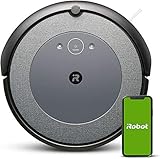


Neato D8 vs Roomba i3: Differences
After experiencing these two robot vacuums for a while, I conclude that the Neato D8 wins 3:1 and ties 1 against the Roomba i3 thanks to its cleaning performance, navigation technology, and other useful features. For more details, please read the breakdown below.
Cleaning Performance
The winner: Neato D8
Compatible floor types
Overall, both the Neato D8 and Roomba i3 are versatile and can clean a wide range of floor surfaces, including hardwood, tile, laminate, and medium-pile carpet.
In my pick-up tests on hard floors, the Neato D8 performed better. It effectively cleaned up all types of debris, including heavy ones like sand and cat litter, as well as larger debris like Froot Loops.
The Roomba i3 also did a good job handling this kind of debris, but it required more passes to pick up everything due to its weaker suction power compared to the Neato.
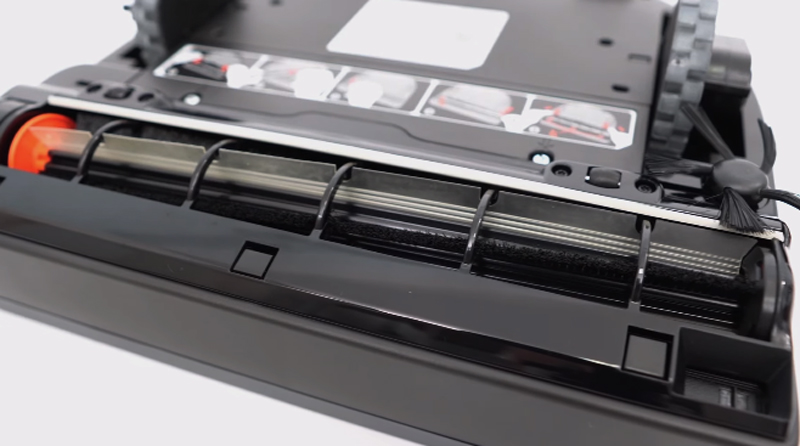
The D8 features two cleaning modes: Eco and Turbo. In Turbo mode, the suction power is increased, allowing it to more effectively pick up debris. In contrast, the Roomba i3 only has one suction mode. In return, the i3 is equipped with iRobot’s Dirt Detect technology, which allows it to identify high-traffic areas and clean them more thoroughly.
For cleaning edges, each machine includes a side brush for more efficiency. The Neato D8’s D-shape design improves edge cleaning compared to round-shape robot vacuums.
As for cleaning carpets, I have noticed that both the Neato D8 and Roomba i3 perform similarly. The Neato D8 boasts impressive suction power but only has one brush roll. On the other hand, the Roomba i3 has two rubber brush rolls that effectively remove dirt and debris from the surface of the carpet and penetrate deep into the fibers.
Pet hair performance
As a pet owner, I highly recommend the Roomba i3 for its dual rubber brush roll that effectively picks up pet hair. Even when dealing with a significant amount of hair, the i3 manages to avoid getting tangled. Moreover, the roller’s design helps minimize hair wrap, making it easy to clean.
The Neato D8 is capable of effectively removing pet hair, but a lot of the picked-up hair gets caught around the bristle brush. Pet hair caught in stiff bristles is also harder to remove compared to rubber rollers. In my opinion, this robot is more suitable for pet owners with short-haired pets.
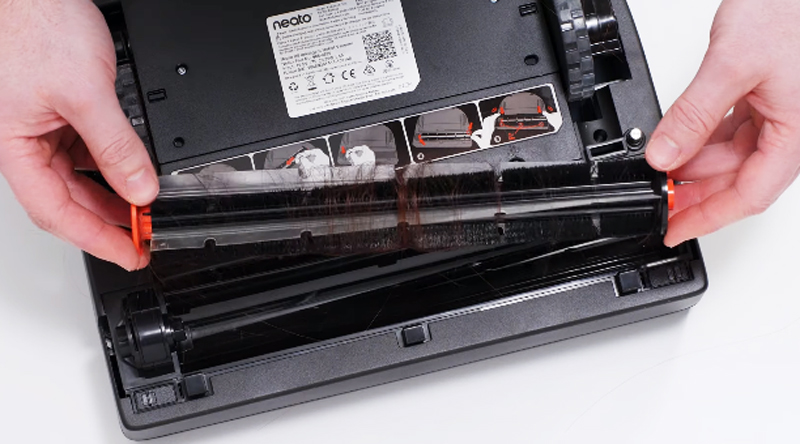
Design & Usability
The winner: Neato D8
Build quality
When comparing the build quality of the Roomba i3 and the Neato D8 robot vacuums, both devices are designed with a focus on durability and performance.
Starting with the Roomba i3, it boasts a solid build quality with a sleek and compact design. The Roomba i3 is a durable and reliable vacuum that can withstand daily wear and tear. It features a protective bumper that prevents collisions with furniture and other obstacles, as well as a durable dustbin and brush roll to ensure long-lasting use.
The Neato D8 also offers a well-constructed robot vacuum. Neato devices are known for their D-shaped design, which allows them to reach corners and edges more effectively than round robots. The D8 is designed for durability, with a robust outer shell and a spacious, effortless-to-empty dustbin.
Dimensions and weight
The Neato D8 is designed with a unique D-shaped profile that distinguishes it from the traditional round-shaped robot vacuums. It measures approximately 12.55 inches in width, 13.20 inches in length, and 3.92 inches in height. This D-shaped design allows the D8 to effectively reach and clean edges and corners with precision.
In contrast, the Roomba i3 features a more traditional circular design. The Roomba i3 is designed with a compact and round shape, measuring approximately 13.26 inches in diameter and 3.63 inches in height, which allows it to navigate through tight spaces and fit under furniture with ease.
In terms of weight, the Neato D8 weighs about 8.09 pounds. It is fairly heavy compared with the other robot vacuums I have reviewed before. Conversely, the Roomba i3 is lighter, weighing approximately 7.44 pounds.
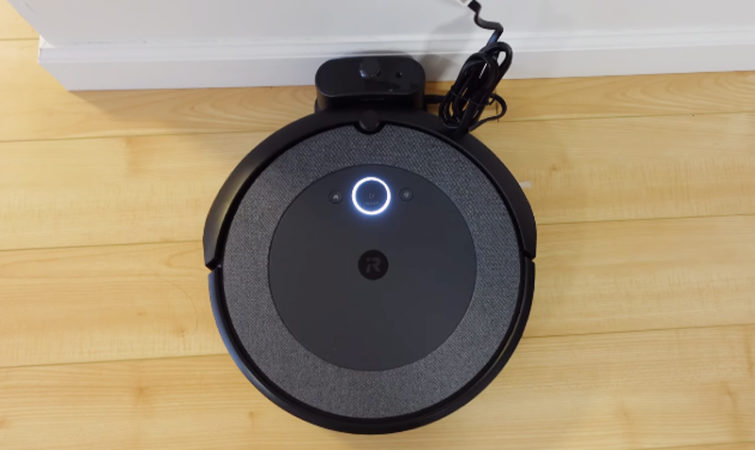
The D8’s D-shape design is great for cleaning edges, but it can hinder the device’s movement sometimes. It may get stuck in the same spot multiple times and can’t get out on its own, whereas the Roomba i3 doesn’t encounter this issue.
Battery and charging
The Roomba i3 and Neato D8 both use reliable lithium-ion batteries commonly found in modern electronics. Regarding their battery life, the Roomba i3 can run for up to 75 minutes on a single charge, while the Neato D8 offers a slightly longer battery life of up to 100 minutes. Both models can return to their charging docks and resume cleaning if their batteries run low, ensuring complete coverage.
In terms of charging times, the Roomba i3 typically takes around 2 hours to fully recharge its battery from empty. Meanwhile, the Neato D8 has a slightly longer charging time of approximately 2 to 3 hours.
You can easily charge these two machines using their docking stations that connect to regular electrical outlets. These docking stations are essential for the robots’ independence, as they automatically return to the dock when necessary, ensuring they are always prepared to clean your home.
Noise
My tests show that both machines are pretty quiet, but the Roomba i3 is fairly quieter than the Neato D8.
The Neato D8 typically produces noise levels between 62 and 71 dB, while the Roomba i3 ranges from 60 to 64 dB. However, these numbers can vary depending on factors such as the cleaning mode and the surface it’s cleaning. Overall, their sound is roughly equivalent to the sound of a normal conversation or background music at a moderate volume.
Navigation and obstacle avoidance
The Neato D8 and the Roomba i3 feature different navigation technologies.
The D8 has the upper hand in this aspect since it employs laser-based LiDAR technology. This allows the D8 to create a detailed and accurate map of your home’s layout. LiDAR sensors emit laser beams to measure distances and detect obstacles, helping the robot build its map while also avoiding collisions.
On the other hand, the Roomba i3 doesn’t employ LiDAR technology. It relies on adaptive software algorithms and a suite of sensors to navigate around obstacles and create a map of your home. Its floor tracking sensor enables the device to move in straight, efficient lines, while the cliff sensors prevent falls down stairs.
Additionally, the Neato D8 has a feature called No-Go Zones, which allows you to draw boxes on the map in the app to keep the robot from going where you don’t want it to go. The Roomba i3 does not support any such features. When it encounters obstacles, it may still collide with the object and then change direction.
Control
The winner: Neato D8
Control
Both machines provide a range of control methods to interact with the robot vacuum.
First, they offer physical buttons on the robot itself, allowing you to start or stop cleaning sessions directly on the device.
For more advanced control, you can control these machines through apps. The Neato smartphone app is available for both iOS and Android users. A standout feature is the ability to set capability zones to designate no-go zones within your home using the app.
The iRobot Home app is available for both iOS and Android and provides extensive control over the i3. It allows you to initiate, schedule, and customize cleaning sessions while offering insights through cleaning reports and notifications.
Additionally, both of them are compatible with popular voice assistants like Amazon Alexa and Google Assistant, enabling you to control the robot using voice commands, which can be particularly convenient.
Cleaning & Maintenance
Tie
Regarding their dirt compartment, the Neato D8 has a larger dustbin with a capacity of 0.7 liters, while the Roomba i3 has a capacity of only about 0.5 liters. The common point is that their dustbins are easy to disassemble, empty, and clean.
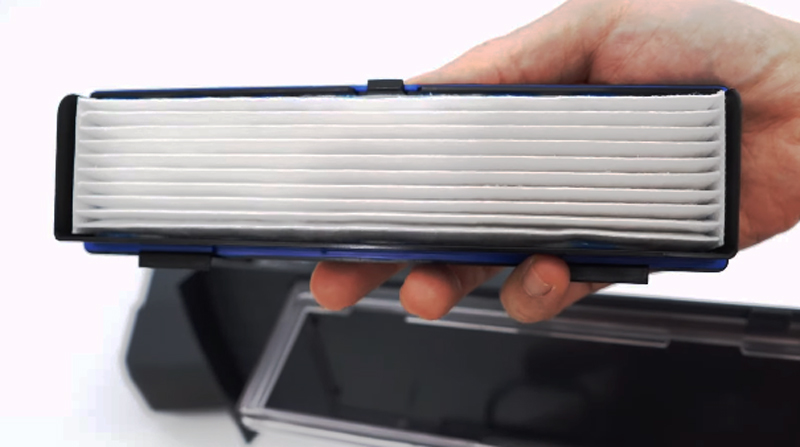
The Roomba i3 has a dirt disposal port at the bottom of the dustbin that works with the Clean Base® Automatic Dirt Disposal. Different from the standard docking station, this one includes a huge dirtbag, allowing the robot to empty itself for up to 60 days. However, this is an optional accessory and is sold separately, so you should consider the cost before buying.
In terms of filtration systems, both machines come with HEPA-standard filters with the ability to capture tiny particles, including dust mites, pet dander, pollen, and even some bacteria and viruses. This makes these devices a good choice for households with allergy sufferers or anyone concerned about indoor air quality.
Great For Value
The winner: Roomba i3
From my point of view, the Roomba i3 is more worth the price. Its iAdapt 2.0 navigation system may not use LiDAR, but it still provides reliable cleaning performance with adaptive software algorithms. The iRobot Home app offers extensive control and customization options, making it easy to use. Additionally, the vacuum’s HEPA-type filter helps to improve air quality, and it’s often priced competitively for a robot vacuum from a reliable brand like Roomba.
The Neato D8 is quite expensive for what you get. Its large size and weight can be a hindrance, and the bristle brush roll tends to get tangled often. Nevertheless, it excels in certain areas, such as its utilization of laser-based LiDAR sensors and SLAM technology, which allow for accurate navigation and mapping.
Quick Rundown Of Neato D8
- The Neato D8 has 100 minutes of runtime and can cover up to 750 square feet on a single charge, but if your robot needs more time, it it can also auto-recharge and resume to finish the job. Neato works smarter so your floors get cleaned faster..Runtime : 100 minutes.Power cord : (6'), 2100mAH 14.4V lithium-ion battery.
- Neato's D-shape design reaches dirt where round robots can't—in corners and along walls with its LaserSmart LIDAR technology, the same technology used in self-driving vehicles, to map and navigate your home with precision, leaving your carpets with those satisfying straight vacuum lines.
- Clean with a Spiral Combo Brush that’s up to 70% bigger than those round robots. It’s effective on any surface—hardwood, carpet or tile—so it’s great for any home. Neato’s large dirt bin at 0.7 liters means less frequent emptying
- Control your robot remotely through the MyNeato app. Schedule cleaning with Routines and create virtual No-Go Zones to define areas you want your robot to avoid.
- For those extra tough areas, just shift into Turbo mode for a deep, thorough clean with extra pickup. It increases suction and speeds up the Spiral Combo Brush, getting into every last crack and crevice—Neato D8 offers 20% greater dirt pickup than D3 & D5 (tested in internal labs).
Quick Rundown Of Roomba i3
- POWERFUL CLEANING—SCHEDULED AROUND YOUR LIFE - Whether you’re relaxing at home or out enjoying life, Roomba i3 EVO takes care of dirt and messes with a Premium 3-Stage Cleaning System and 10x the Power-Lifting Suction*. *Compared to Roomba 600 series.Runtime : 75 minutes
- CLEAN BY ROOM, YOU’RE IN CONTROL - Roomba i3 EVO learns your home and creates an Imprint Smart Map so you can direct it to clean any room you want, any time you want—either on a set schedule or in the moment.
- CLEANING IN TIDY ROWS - Cleans intelligently in straight lines back and forth, to thoroughly clean your floors while navigating around furniture. When the i3 EVO needs to recharge, it will resume right where it left off ensuring a complete clean. Charger : 120V and 60 Hz
- FOCUSED CLEANING - Patented Dirt Detect Technology allows the Roomba i3 EVO to detect dirtier areas of your home and clean them more thoroughly. Integrated sensors tell the robot where it can and can’t fit, so it doesn’t get stuck under furniture.
- PERFECT FOR HOMES WITH PETS - Instead of using a single bristle brush, Roomba i3 EVO uses Dual Multi-Surface Rubber Brushes that flex to adjust to different floor types and avoid getting tangled with pet hair.
Product Videos
Related Articles to Roomba I3
- iRobot Roomba I3 Vs S9+: A Detailed iRobot Vacuum Comparison
- Roomba 692 vs i3: A Head-To-Head Comparison
- Roomba 671 Vs I3: Pros, Cons, and Performance
- Roborock Q5 vs Roomba I3: Clean Homes Powerhouse Face-Off!
- Roomba 981 Vs I3: How Do You Choose The Best Option For Your Home?
- Roomba 698 vs i3: Best Picks for Your Home!
- Roomba i3 vs j7: A Clash of Premium vs. Entry-Level Models
- Roomba i3 vs i7: Which Robot Vacuum Is Right For You?
- Roomba i3 vs i4: Which Affordable Entry-Level Roomba Is the Better Choice?
- Roomba i3 vs 960: Which iRobot Roomba Is The Most Affordable Option?
- Eufy G30 vs Roomba i3: Which Is The Better Option For Your Home?
References:
- Neato D8: https://shopeu.neatorobotics.com/products/neato-d8-intelligent-robot-vacuum
- Roomba i3: https://www.irobot.com/en_US/roomba-i3-evo-robot-vacuum/I315020.html

Richard B. Schmidt is a prominent figure in the vacuum cleaner industry, boasting over 15 years of expertise. Armed with a Robotics Engineering degree from Northeastern University and a Master’s in Consumer Science from Harvard, his unique blend of technical knowledge and consumer insights positions him as a sought-after authority in vacuum cleaner evaluation. Richard’s career began at Dyson, where he contributed to the development of innovative vacuum models. Transitioning to advocacy and reviews, he co-founded the first Vacuum-focused blog in 2008, offering comprehensive analysis and user guides for various vacuum cleaners. In 2020, he founded RoboMop.net, providing ongoing insights through columns and buyer’s guides.
